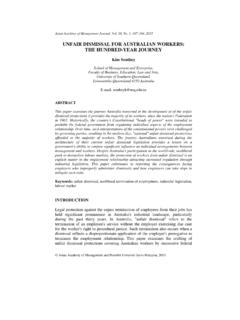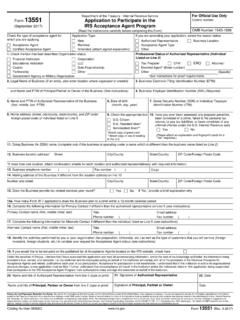Transcription of THE SUPREME COURT OF APPEAL OF SOUTH AFRICA …
1 THE SUPREME COURT OF APPEAL OF SOUTH AFRICA . JUDGMENT. Reportable Case No: 958/2013. In the matter between: gidimisani gilbert RAMAITE appellant . and THE STATE RESPONDENT. Neutral citation: Ramaite v The State (958/13) [2014] ZASCA 144 (26. September 2014). Coram: Cachalia and Willis JJA and Schoeman AJA. Heard: 9 September 2014. Delivered: 26 September 2014. Summary: Criminal law rape 11 year old relative of accused accused conducting his own defence fairness of hearing without legal representation waiver of right to legal representation. 2. _____. ORDER. _____. On APPEAL from: The Limpopo High COURT , Thohoyandou (Hetisani J). sitting as COURT of first instance. 1 The APPEAL is allowed. 2 The conviction and sentence are set aside. _____. JUDGMENT. _____. Schoeman AJA (Cachalia J concurring). [1] The appellant was charged in the regional COURT , Sibasa, with the rape of a young girl who was 11 years old at the time of the incident in August 2002.
2 He did not have a legal representative at the time the trial commenced. After a very brief trial he was convicted. The provisions of s 51 of the Criminal Law Amendment Act 105 of 1997 (the Act) read with Part 1 of Schedule 2 of the Act were applicable, as the victim was under the age of sixteen years and therfore the case was transferred to the high COURT for sentencing purposes, as life imprisonment is the prescribed minimum sentence. In the high COURT , Thohoyandou, the appellant was sentenced to life imprisonment (Hetisani J). The appellant appeals to this COURT against both conviction and sentence with leave of the COURT a quo. 3. [2] In this COURT the appellant was represented by counsel from the Thohoyandou Justice Centre. Several grounds of APPEAL were raised mainly relating to the irregular conduct of the trial. It was contended that the regional COURT magistrate failed: (a) to apprise the appellant of his right to legal representation before the trial commenced; (b) properly to explain his right to cross-examination; and (c) to assist the appellant when it was clear that the appellant did not know how to cross-examine the witnesses.
3 [3] I should add that after the appellant was convicted and the matter transferred to the high COURT for sentencing, the appellant was legally represented. But it seems that the legal representative did not dispute the fairness of the proceedings before the magistrate and the judge did not consider whether the proceedings in the trial COURT were in accordance with justice prior to sentencing the appellant to life imprisonment. This omission, however, has no bearing on the outcome of the APPEAL as this COURT is in a good position to determine whether the trial was conducted fairly as the sentencing judge was. I turn to consider each of the irregularities, which it is contended cumulatively, vitiated the fairness of the trial. The trial magistrate failed to inform the appellant of his right to legal representation. [4] The record reflects that before the trial commenced the prosecutor informed the magistrate that the appellant had previously indicated that he wished to conduct his own defence.
4 The magistrate enquired from the appellant whether that is the position wherafter the appellant answered 4. yes . The appellant was thereupon asked to plead to the charge. He entered a plea of not guilty. [5] We were belatedly provided with transcripts of the district and regional courts record pertaining to the postponement proceedings as well as an affidavit by the regional COURT magistrate who postponed the appellant s case on 20 November 2002. It indicates that the appellant was explained the right to legal representation and he elected to approach the Law Clinic . Neither counsel for the appellant , nor the state, were able to explain what the Law Clinic is, but it is clear that the appellant wanted legal representation at the time. [6] There is simply no indication why and when the appellant supposedly changed his mind and waived his right to obtain legal representation between 20 November 2002, the date when his rights were explained to him and 8 January 2003, when the trial commenced.
5 The appellant was in custody from his arrest (which according to the charge sheet was on 15. August 2002) until 4 December 2002 when the record reflects that he was on warning. There is no indication from the record, except for the statement tendered from the bar by the prosecutor, that the appellant wished to conduct his own defence, and the appellant s confirmation to this effect. What is clear, however, is that the trial magistrate did not embark on any inquiry to determine the circumstances that led to the appellant s waiving his right after initially expressly indicating that he wanted legal representation. [7] It is also clear that the trial magistrate neither informed the appellant what the consequences of proceeding with the trial without the assistance of 5. a legal representative were, nor encouraged him to obtain the services of a legal representative, before he was made to plead to the charge.
6 [8] The magistrate did explain to the appellant after he had pleaded that if convicted, the matter would be transferred to the high COURT and he could face a sentence of life imprisonment, the prescribed minimum sentence. But this was merely communicated to the appellant as a matter of fact, but not with a view to encourage him to obtain legal representation owing to the seriousness of the charge and the consequences that would ensue in the event of him being convicted. It seems, due to the lack of any reference to legal representation, that this was done solely to comply with his duty to inform an unrepresented accused that he faced a minimum sentence. 1. [9] Before the advent of the Constitution the right to legal representation and to be informed of this right was firmly entrenched in our law. Thus in S. v Radebe; S v Mbonani Goldstone J referred to: .. a general duty on the part of judicial officers to ensure that unrepresented accused fully understand their rights and the recognition that in the absence of such understanding a fair and just trial may not take place.
7 2. And at 196 F-I: If there is a duty upon judicial officers to inform unrepresented accused of their legal rights, then I can conceive of no reason why the right to legal representation should not be one of them. Especially where the charge is a serious one which may merit a sentence which could be materially prejudicial to the accused, such an accused should be informed of the seriousness of the charge and of the possible consequences of a conviction. Again, depending upon the complexity of the charge, or of the legal rules relating thereto, and the seriousness thereof, an accused should not only be told of this right but he should be encouraged to exercise it. He should be given a reasonable time 1. S v Maake 2011 (1) SACR 263 (SCA) para 27. 2. S v Radebe; S v Mbonani 1988 (1) SA 191 (T) at 195B. 6. within which to do so. He should also be informed in appropriate cases that he is entitled to apply to the Legal Aid Board for assistance.
8 A failure on the part of a judicial officer to do this, having regard to the circumstances of a particular case, may result in an unfair trial in which there may well be a complete failure of justice. (My emphasis.). [10] The right is ensconsed in the Constitution, which includes the right to choose and be represented by a legal practitioner; and to have a legal practitioner assigned to the accused person by the state and at state expense, if substantial injustice would otherwise result and to be informed of these rights Furthermore, that .. the accused's rights were explained to him, must appear from the record, in such a manner as, and with sufficient particularity, to enable a judgment to be made as to the adequacy of the explanation 4. It would not be sufficient to record that the rights have been explained without sufficient particulars to determine whether that was in fact adequate.
9 It is clear that if a judicial officer believes that an accused is aware of his rights, the right to legal representation must nevertheless be properly explained to him, in open COURT . If the accused chooses not to have legal representation in serious cases, it is incumbent on the presiding officer to inform an accused of the seriousness of the charges and advise him to make use of a legal It can safely be assumed in any case where the possibility of imprisonment is real, an injustice would result if an accused does not have legal representation. 6 For such explanation to be effective, it must be done prior to the commencement of the trial, which means prior to an accused pleading to the charges. 3. S 35(3)(f) and (g) of the Constitution. 4. S v Dani ls & n ander 1983(3) 275 (A) at 299G-H. 5. S v May 2005 (2) SACR 331 (SCA); S v Sikhipha 2006 (2) SACR 439 (SCA) para 10. 6. S v Lombard & n ander 1994 (2) SACR 104 (T) at 108j; S v Moos 1998 (1) SACR 372 (C) at 379E.
10 7. [11] It is, however, not the failure of the magistrate to record the rights that have been explained accurately that is irregular, but the failure to explain those rights. In S v Mabuza7 it was found that the failure to record verbatim what was explained to an accused was not an irregularity, as .. it appears from his cryptic notes and also from his judgment, which were recorded verbatim, that not only did he inform them of their right to legal representation when they first appeared in COURT and again before the trial commenced, but he also explained its importance, the seriousness of the charges and their right to apply for legal aid. Nor is there any suggestion that they did not understand the magistrate's explanation when they elected to conduct their own defences. Each indicated he did.. [12] Before it can be said that the appellant waived his right to legal representation between 20 November 2002 when he indicated that he elected to approach the Law Clinic , and 8 January 2003 when the prosecutor informed the COURT that the appellant had elected to conduct his own defence, the state had to prove that the appellant had waived his right in the full knowledge of what he was doing.













